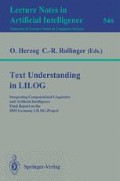Abstract
The LILOG system under development at IBM Germany is a text understanding system with a question/answering component for proving successful text processing. The texts under investigation are non-technical texts understandable for ‘normal people’ with commonsense knowledge. As well known in AI, text understanding systems require background knowledge for dealing with tacit and implicit textual information; in our case, this background knowledge has to be a kind of commonsense knowledge. The LILOG project works with the logical paradigm for reconstructing models of the world as the relevant domain of discourse. The modeling itself is oriented towards both the linguistic requirements and the demands resulting from tractability aspects of inference.
In this paper we characterize the texts under investigation and sketch the relevant features of the logical language for the modeling task. We will present examples of linguistic requirements and discuss some features of the model already implemented. The lesson learned from these works is that ‘classical’ knowledge acquisition techniques and methodologies developed for socalled expert systems are not suitable for commonsense modeling with underspecified tasks in mind, as in text understanding systems for nontechnical texts.
On the basis of these experiences a new methodology is sketched and discussed. Examples of tools for supporting this undertaking are given.
Preview
Unable to display preview. Download preview PDF.
References
James F. Allen, Henry A. Kautz: A model of naive temporal reasoning. In J. R. Hobbs, R. C. Moore (eds.): Formal Theories of the Commonsense World, p. 251–268, Ablex, Norwood, NJ, 1985
Ronald J. Brachman, James G. Schmolze: An overview of the KL-ONE knowledge representation system. Cognitive Science, 9 (2):171–216, April 1985
Ronald J. Brachman, Victoria Pigman Gilbert, Hector J. Levesque: An essential hybrid reasoning system: knowledge and symbol level accounts in KRYPTON. In Proceedings of the 9th International Joint Conference on Artificial Intelligence, p. 532–539, Los Angeles, Cal., August 1985
Patrick J. Hayes: The naive physics manifesto. In D. Michie (ed.) Expert Systems in the Microelectronic Age. Edinburgh Univ. Press, 1979
Jerry R. Hobbs, William Croft, Todd Davies, Douglas Edwards, Kenneth Laws: Commonsense metaphysics and lexical semantics. Computational Linguistics, 13(3–4):241–250, December 1987
Helmut Horacek: Towards principles of ontology. In D. Metzing (ed.) Proc. GWAI-89, p. 323–330, Springer-Verlag, Berlin, Heidelberg, New York, 1989
Ewald Lang: Semantik der Dimensionsauszeichnung räumlicher Adjektive. In Manfred Bierwisch, Ewald Lang (eds.): Grammatische und konzeptuelle Aspekte von Dimensionsadjektiven, p. 287–458, Akademie Verlag, Berlin, 1987
Ewald Lang, Kai-Uwe Carstensen: OSKAR-Ein Prolog-Programm zur Modellierung der Struktur und der Verarbeitung räumlichen Wissens. In D. Metzing (ed.): Proc. GWAI-89, p. 234–243, Springer-Verlag, Berlin, Heidelberg, New York, 1989
Wendy G. Lehnert: Knowledge-based natural language understanding. In Howard Shrobe (ed.): Exploring Artificial Intelligence, p. 83–131, Morgan Kaufmann, San Mateo, CA, 1988
Douglas Lenat, Mayank Prakash, Mary Shepherd: Cyc: using common sense knowledge to overcome brittleness and knowledge acquisition bottlenecks. The AI Magazine, 6 (4): 65–85, 1986
William C. Mann, Yigal Arens, Christian M. I. M. Matthiessen, Shari Naberschnig, Norman K. Sondheimer: Janus abstraction structure — draft 2. Draft paper, University of Southern California, Information Science Institute, Marina del Rey, CA, October 1985
Ira Monarch, Sergei Nirenburg: The role of ontology in concept acquisition for knowledge-based systems. In John Boose, Tom Addis, Brian Gaines (eds.): Proc. EKAW-87, Reading University, 1987
Udo Pletat, Kai von Luck: Knowledge Representation in LILOG. In Karl-Hans Bläsius, Uli Hedtstück, Claus Rollinger (eds.): Sorts and Types in Artificial Intelligence, Lecture Notes in Artificial Intelligence, Vol. 418, p. 140–164, Springer-Verlag, Berlin, Heidelberg, New York, 1990
Editor information
Rights and permissions
Copyright information
© 1991 Springer-Verlag Berlin Heidelberg
About this chapter
Cite this chapter
Klose, G., von Luck, K. (1991). The background knowledge of the LILOG system. In: Herzog, O., Rollinger, CR. (eds) Text Understanding in LILOG. Lecture Notes in Computer Science, vol 546. Springer, Berlin, Heidelberg. https://doi.org/10.1007/3-540-54594-8_75
Download citation
DOI: https://doi.org/10.1007/3-540-54594-8_75
Published:
Publisher Name: Springer, Berlin, Heidelberg
Print ISBN: 978-3-540-54594-1
Online ISBN: 978-3-540-38493-9
eBook Packages: Springer Book Archive

